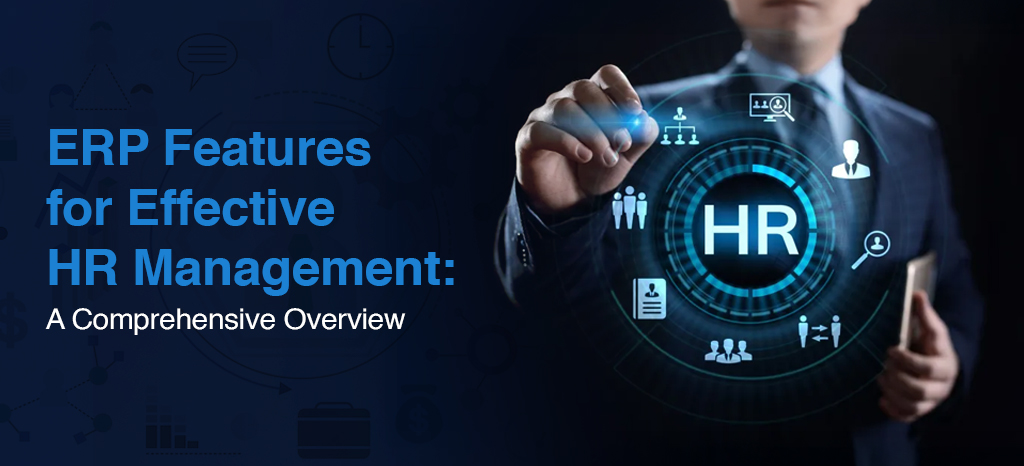
Effective Human Resource (HR) management is the backbone of any successful organization. From recruiting top talent to maintaining employee satisfaction and ensuring regulatory compliance, HR plays a crucial role in business success. However, traditional methods of managing HR functions often involve excessive paperwork, redundant processes, and manual errors.
Enterprise Resource Planning (ERP) systems offer a solution to these challenges by integrating various HR functions into a single, streamlined digital platform. ERP software helps businesses improve operational efficiency, accuracy, and decision-making through automation and centralized data management. With Customized ERP solutions, companies can tailor their HR systems to meet specific organizational needs and workforce requirements.
This blog provides a comprehensive overview of the essential ERP features designed to optimize HR management, aiming to guide businesses in selecting and implementing ERP solutions that align with their workforce strategies.
Key ERP Features for HR Management
1.Recruitment and Talent Acquisition
ERP systems simplify and enhance recruitment by providing tools for posting job vacancies, tracking applicants, and managing candidate evaluations. Features include:
- Automated job postings across platforms
- Applicant tracking system (ATS) for resume screening and shortlisting
- Centralized candidate database with filters for skills, experience, and qualifications
- Interview scheduling and communication tracking
These tools not only accelerate the hiring process but also improve the quality of hires by enabling data-driven decision-making.
2.Employee Data Management
A core feature of ERP in HR is maintaining a centralized database for employee information. This includes:
- Personal and contact details
- Employment history and job roles
- Performance reviews and promotions
- Compliance documents and certifications
Centralized data management eliminates duplication, ensures consistency, and provides HR teams with instant access to accurate employee records.
3.Payroll and Benefits Administration
ERP systems automate payroll processing, including salary computation, tax deductions, bonuses, and benefits management. Key features include:
- Integration with attendance and time tracking
- Automated pay slip generation and tax calculations
- Benefits enrollment and administration
- Compliance with labor and tax regulations
This automation ensures timely and accurate payments while reducing the administrative burden on HR teams.
4.Performance Management
ERP platforms provide structured tools for monitoring and evaluating employee performance. Features typically include:
- Goal setting and alignment with business objectives
- Continuous feedback and check-ins
- Annual or quarterly performance reviews
- Integration with reward systems and career progression paths
These capabilities help in recognizing top performers, identifying areas for improvement, and aligning employee development with organizational goals.
5.Time and Attendance Tracking
Tracking employee attendance and work hours is vital for payroll accuracy and workforce planning. ERP systems offer:
- Biometric or mobile-based check-ins and check-outs
- Real-time tracking of work hours, overtime, and shifts
- Leave management and approvals
- Automated integration with payroll systems
This ensures fair labor practices, supports compliance, and provides visibility into employee productivity.
6.Training and Development
Employee development is key to maintaining a skilled and motivated workforce. ERP systems support this with features such as:
- Learning management systems (LMS) integration
- Course creation and enrollment tracking
- Certification management and reminders
- Analytics to track training effectiveness
By automating training workflows, organizations can better prepare their workforce for evolving business demands.
Benefits of ERP for HR Management
-
Improved Efficiency
ERP automates repetitive tasks like payroll processing, data entry, and performance reviews, saving time and reducing administrative overhead.
-
Enhanced Data Accuracy
With a centralized database and real-time updates, ERP minimizes errors and ensures consistent and reliable information across departments.
-
Better Decision-Making
Built-in analytics provide HR managers with insights into hiring trends, employee performance, and workforce planning, supporting strategic decision-making.
-
Increased Employee Engagement
Employee self-service portals improve transparency and give staff more control over their profiles, leave requests, and performance tracking, leading to higher satisfaction.
Best Practices for Implementing ERP for HR Management
-
Define Clear Requirements
Identify key HR pain points and set clear objectives for what you want the ERP system to achieve. This includes understanding which processes need automation and which KPIs to track.
-
Choose the Right ERP System
Select a solution that offers the flexibility to scale with your business, integrates with existing systems, and aligns with your HR goals.
-
Provide Adequate Training
Ensure that HR personnel and end-users are trained on the new system. Regular workshops and support resources will facilitate smoother adoption and reduce resistance to change.
FAQs
Conclusion
Integrating ERP features into HR management can transform how organizations recruit, manage, and retain talent. From simplifying payroll to empowering employees through self-service tools, ERP systems provide a holistic solution for modern HR challenges.
Businesses looking to elevate their HR operations should consider implementing a tailored ERP solution that aligns with their unique goals.
Kyle Solutions, Leading Business solution providers in Calicut, offers end-to-end business solutions including HR and CRM management. Contact us today to discover how our tailored ERP solutions can streamline your HR functions and drive growth.


